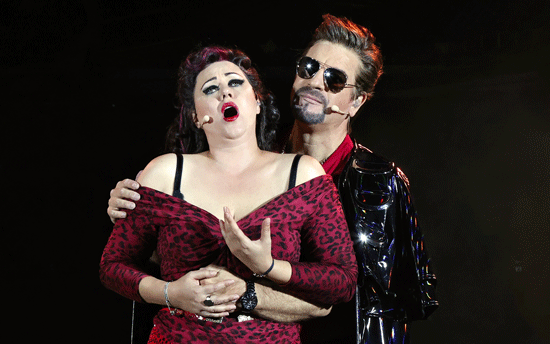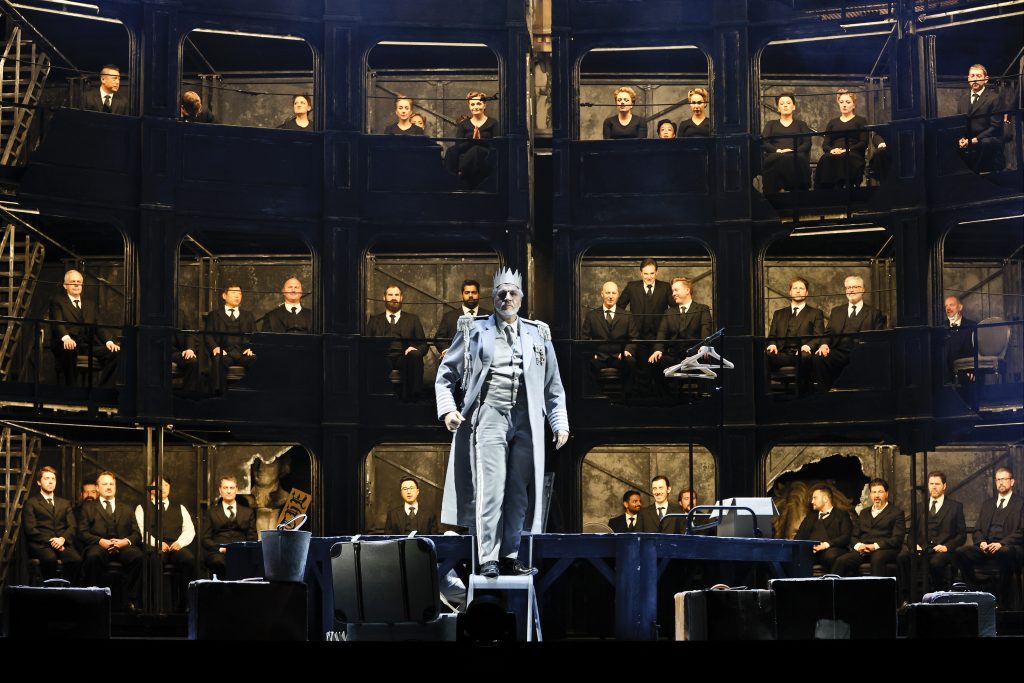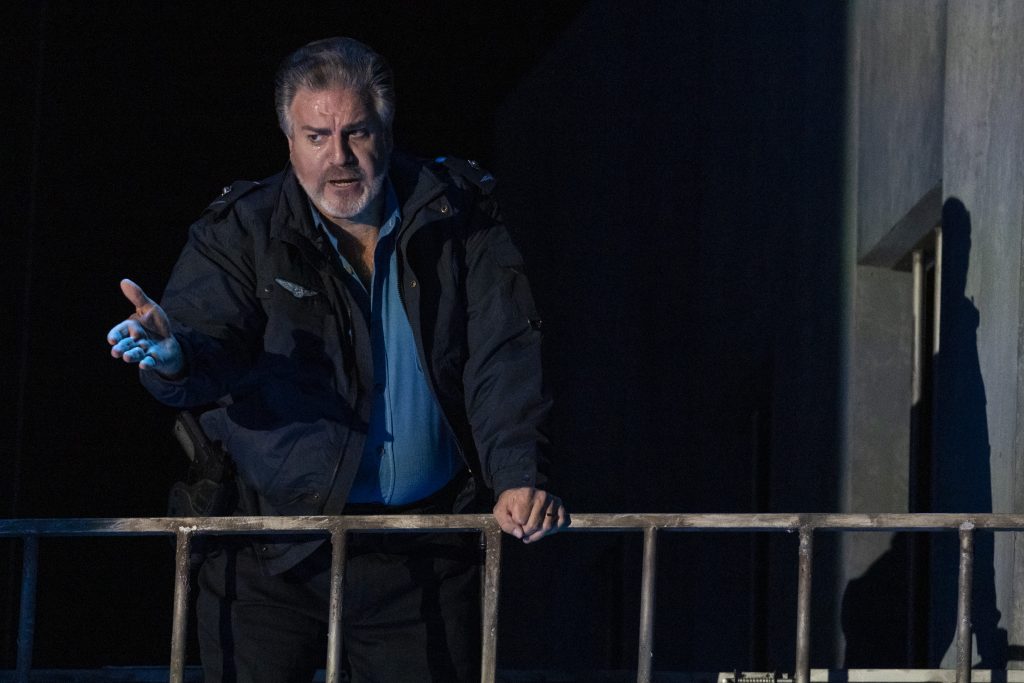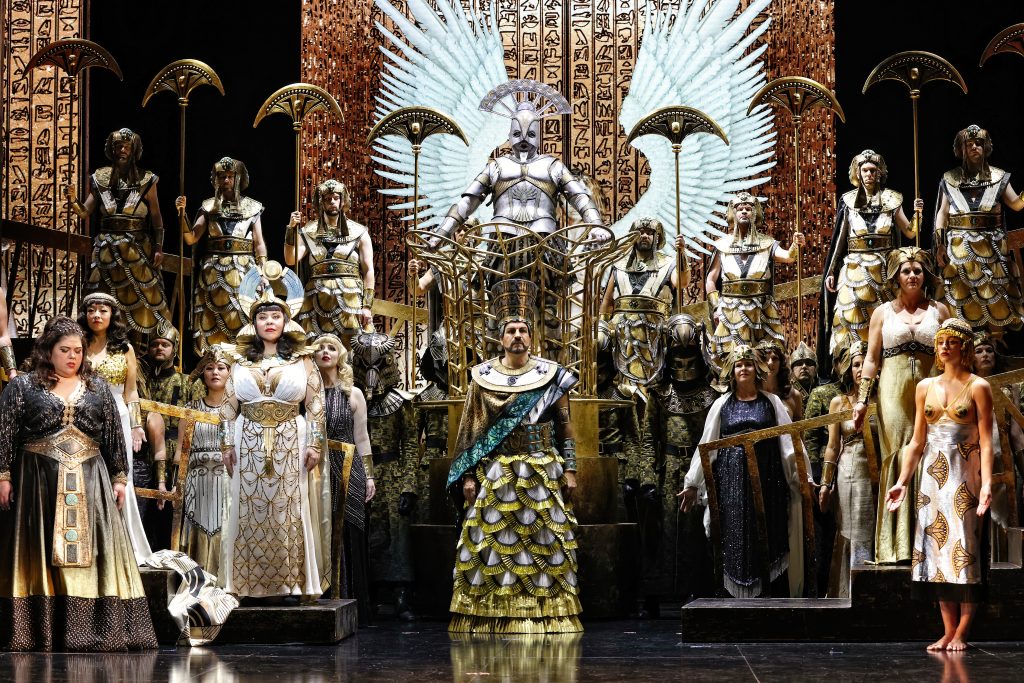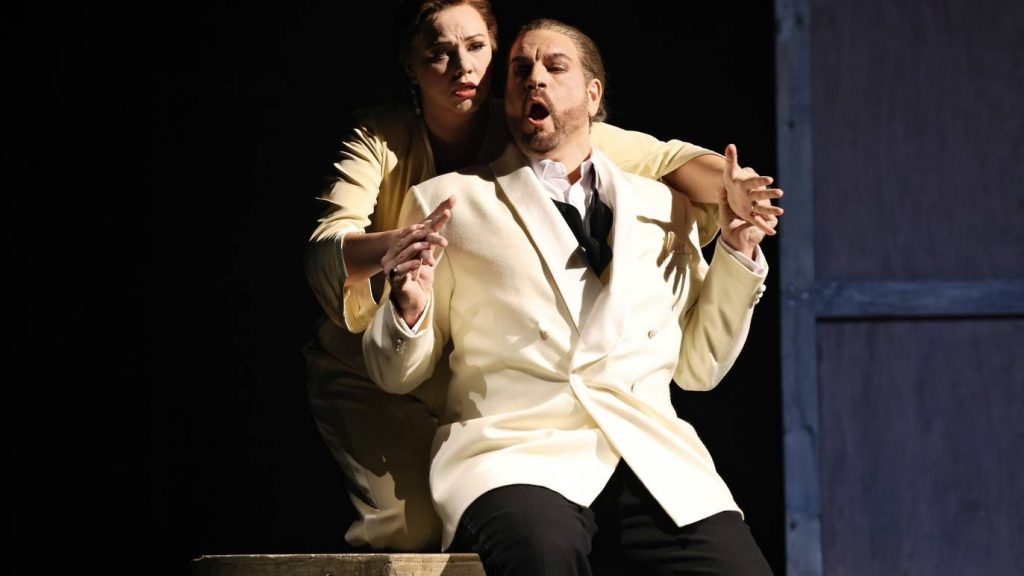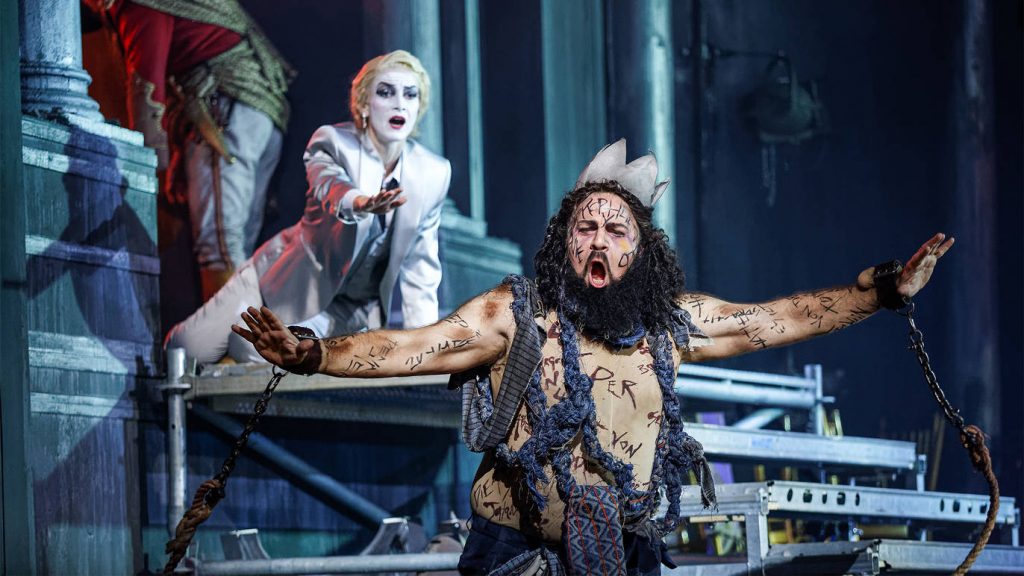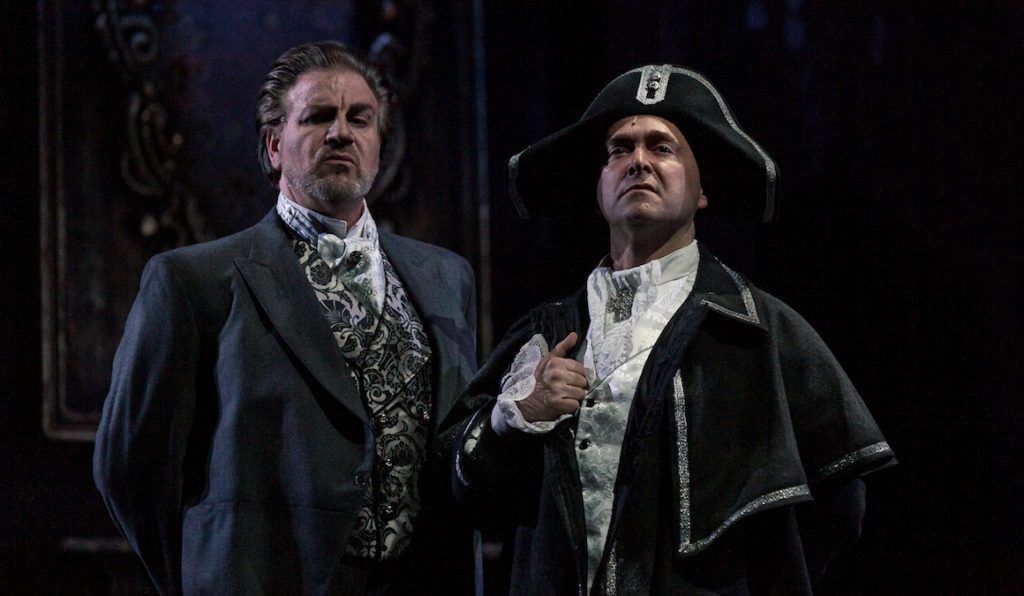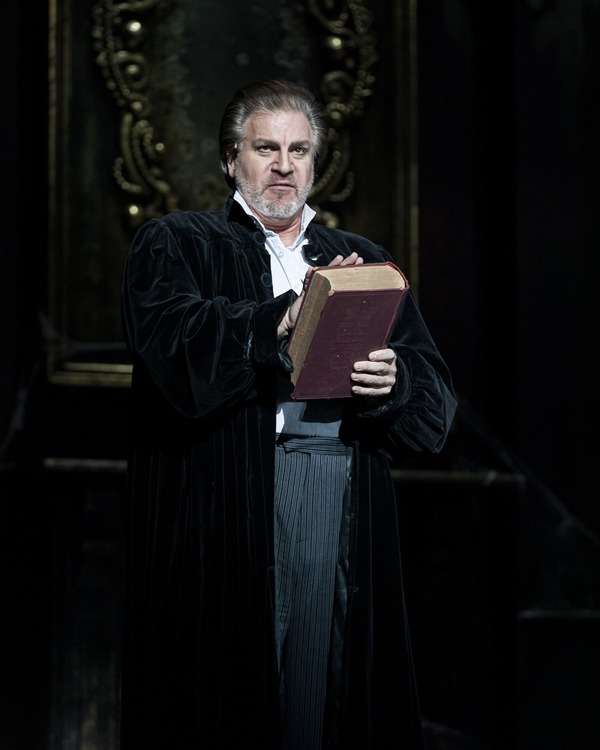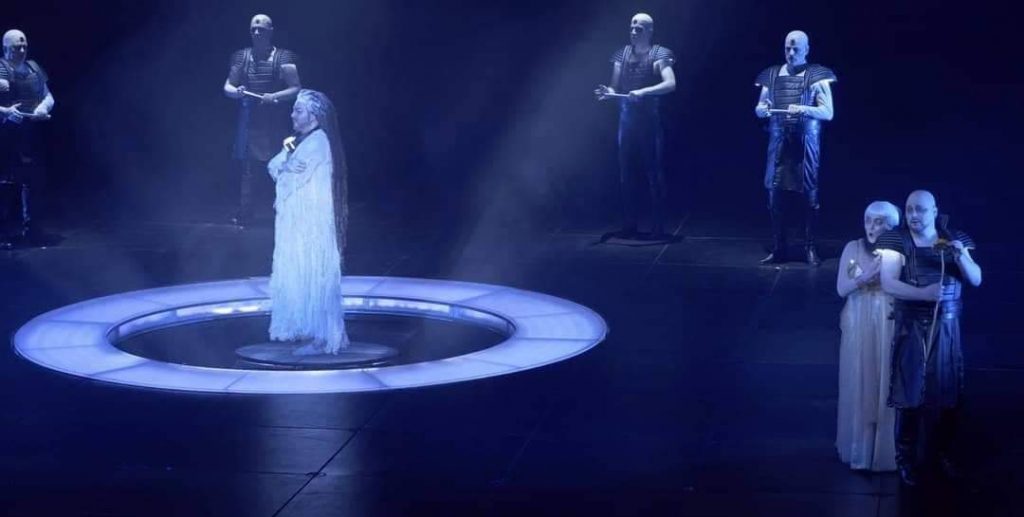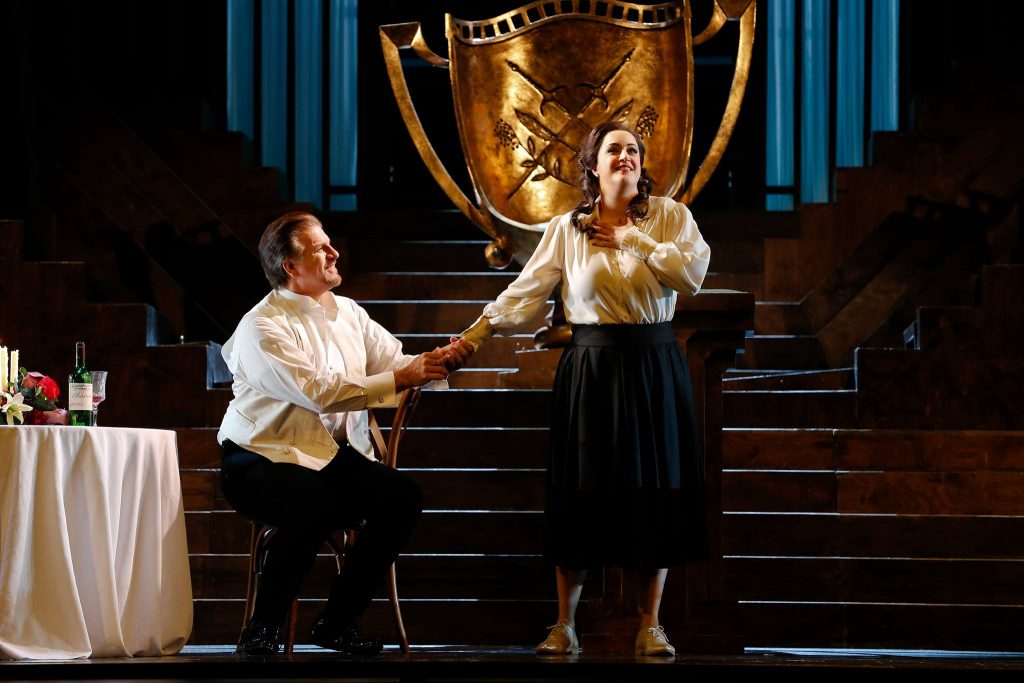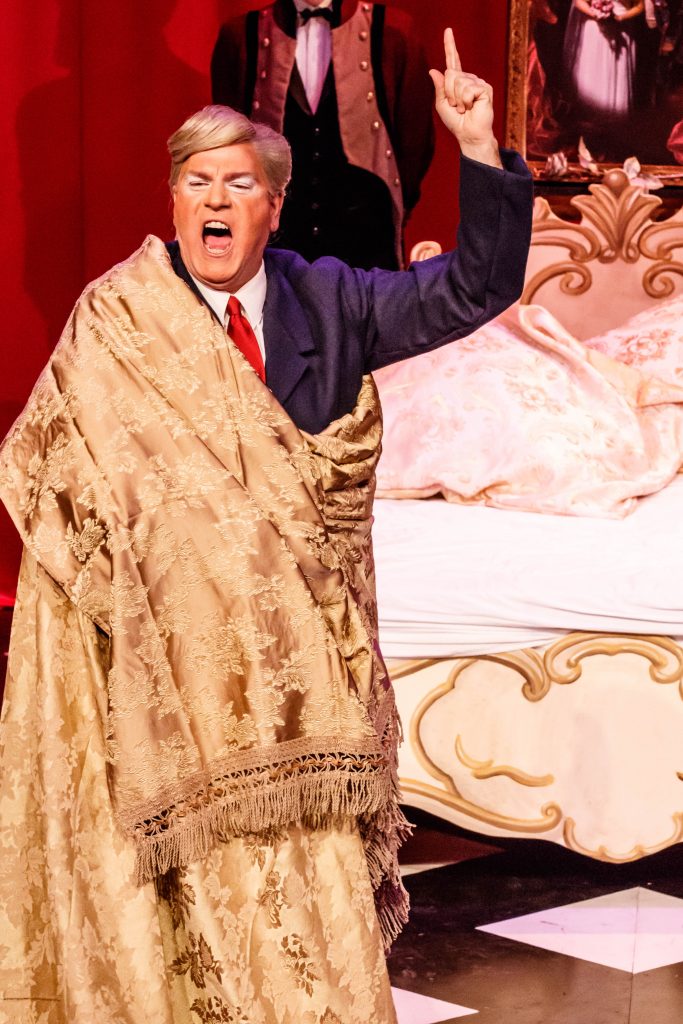Carmen – Opera Australia
Daily Telegraph – November 28, 2022 (Tom Pillans)
The object of his jealousy, the torero Escamillo, was performed with rock star-like elan by the always impressive Daniel Sumegi, he of the stirring oh-so-deep bass baritone and all the assurance of a stage veteran.
Timeout – November 28 (Charlotte Smee)
Daniel Sumegi as an aviator-wearing, Elvis-esque Escamillo gives the standout performance – a charismatic and powerful bass-baritone.
Australian Financial Review – November 26 (Michael Bailey)
Daniel Sumegi in his aviator shades looked like he was having the time of his life putting the Elvis into Escamillo, belting Toreador Song to a moshpit of dancers and chorus members, one of whom even flung a bra at him as fireworks exploded above…this was a superbly staged, sung and played production which opera progressives, purists and tourists should enjoy.
The Australian – November 27 (Matthew Westwood)
Into this equation comes the famous bullfighter Escamillo, given the glam rock treatment by bass Daniel Sumegi, whose affair with Carmen arouses Jose’s jealousy…and Sumegi’s nuanced vocal performance.
Sydney Morning Herald – November 26 (Peter McCallum)
Daniel Sumegi, as the Toreador Escamillo, made a rock-star entrance amid a rapturous, bra-throwing mosh-pit frenzy, which he seemed to quite enjoy. The strongly projected dominance through the sound system took away some of his own vocal agency, but he maintained vocal warmth, and the character’s generosity of spirit permeated both voice and persona.
Australian Arts Review – December 1 (Bill Stephens)
Showing every sign of having the best time letting his hair down, as well as providing the high point of the production, internationally acclaimed baritone, Daniel Sumegi, revelled in the rock-god staging of his Toreador’s Song, complete with excited dancers throwing undergarments and screaming so enthusiastically that they threatened to drown out the final chorus, which ended with the fireworks that now appear to have become essential elements for staging outdoor opera.
J-Wire – November 28 (Victor Grynberg)
In terms of 0peratic quality the pick of a very talented group was expatriate Australian bass Daniel Sumegi as the Toreador. His voice is as good a bass as you will hear anywhere, and his acting, critical in this role, is of the same high quality.
Cut Common – November 29 (Chantal Nguyen)
Our toreador Escamillo is Daniel Sumegi, singing from behind his aviators in a skilled and open-hearted bass baritone. Sumegi’s rockstar entrances are loads of fun, emerging through clouds of smoke to hordes of hysterical fans. “Who knew?” I think to myself, as Sumegi deftly catches fan underwear hurled from the moshpit, “that the Toreador Song accompanied by constant screams would sound this good?” This staging of theToreador Song was the evening’s highlight, where Badorrek’s grunge vision – with strobe lighting, rave dancing, and the obligatory OA outdoor fireworks – makes most sense.
Theatre Thoughts – n.d. (Justin Clarke)
Daniel Sumegi’s toreador played as a rock-star icon, who’s entrance was enhanced by flying bras and whizz bang fireworks. The depth of control in his voice brought a strength of believability in his character.
Stage Whispers – n.d. (David Spicer)
Stealing the show was the Toreador song from Escamillo (Daniel Sumegi) dressed like John Travolta from Grease it ended with Opera Australia’s trademark outdoor climax.
Sydney Arts Guide – November 27 (Paul Nolan Nov)
Daniel Sumegi’s Escamillo is sufficiently larger than life. His vocal and emotional tessitura is set to glam-superstar level throughout and his movement about the stage has an Elvis-with-a-makeover vibe. Sumegi does have considerable and believable chemistry with Carmen Topciu’s Carmen. Topciu relishes the chance to be Carmen the rebellious rock-chick.
Stage Noise – November 26 (Diana Simmonds)
As the matador Escamillo, bass-baritone Daniel Sumegi makes a deliciously ballsy entrance in wraparound shades, glittering scarlet shirt and black caped suit, strutting like old Elvis amid hurled knickers and bras. He too sings magnificently which is extra remarkable as all the varied voices, orchestra and chorus are the overall responsibility of sound designer extraordinaire Tony David Cray (also behind the excellent sound of Handa Opera on Sydney Harbour.
Lohengrin – Opera Australia
Bachtrack – May 16, 2022 (David Larkin)
Daniel Sumegi exuded nobility as King Heinrich.
Australian Arts Review – May 16, 2022 (Paul Selar)
Supporting roles are filled equally as outstandingly, with large, authoritative bass Daniel Sumegi in a balancing act of diplomacy and command as King Heinrich.
Australian Book Review – May 16, 2022 (Peter Rose)
Sumegi – Opera Australia’s Wotan in next year’s Ring in Brisbane – brought his usual presence and volume to the king’s role, with its testing high passages.
The Age – May 15, 2022 (Barney Zwartz)
Daniel Sumegi mostly seems to stand around looking noble as King Heinrich, but he matched it with noble singing.
Limelight – May 16, 2022 (Patricia Maunder)
Another familiar face and voice for local Wagner productions is Daniel Sumegi, who adds a little softness and uncertainty to his usual grand presence and bass baritone for the role of troubled King Heinrich.
Fidelio – Irish National Opera
The Times – November 10, 2021 (Fiona Charleton)
Campbell Wallace convinces as Fidelio. Accordingly, we believe it when, in order to find her husband, she worms her way into the affections of Rocco, the senior guard, wonderfully acted and sung by Daniel Sumegi…a world-class production.
The Irish Times – November 11, 2021 (Michael Dungan)
Combined, the direction and music make us like Rocco, sung with great warmth and physical presence by the Australian bass-baritone Daniel Sumegi. Unlike Fidelio, he is pragmatic rather than romantic – career-conscious, insisting that marriage depends on money as well as love – and fearfully subservient to authority.
Bachtrack – November 8, 2021 (Andrew Larkin)
Bass-baritone Daniel Sumegi made for a morally dubious, but ultimately approachable Rocco. The low heft of his voice made for a suitably domineering father/father-in-law. His crise de conscience at the end of Act 2 made sense here since it had been obvious from his body language that he was troubled talking about Florestan and his conditions in Act 1. His duets, trios and quartets with Leonore, Marzelline and Jaquino were some of the highlights of the evening.
No More Workhorse – November 8, 2021 (Paddy McGovern)
The prison is run by Rocco (Daniel Sumegi), not really evil, more the I-was-only-following-orders type. Sumegi’s superb bass-baritone is matched by his characterisation, by turn happy to go along with the boss’s wishes – because it’s his job – and racked by guilt at the idea of murder.
Aida – Opera Australia
Sydney Morning Herald – June 24, 2021 (Peter McCallum)
Daniel Sumegi sang Ramfis with fine-edged projection and haughty severity.
Operawire – July 2, 2021 (Gordon Williams)
Daniel Sumegi (Ramfis)…etched out perfectly drawn supporting characters. The color-matching of voices, noticeable immediately in La Colla and Sumegi’s first scene dialogue, was another example of the narrative vividness of this production.
J-Wire – June 24, 2021 (Victor Grynberg)
Only a few months ago we were able to hear the magnificent baritone voice of Sydney born Daniel Sumegi starring in Bluebeard’s Castle. Now we have the pleasure of having Sumegi reprise the first role he ever sang for OA, 26 years ago as Ramfis, the High Priest. With tremendous depth to his rich voice and great physical stature, it’s no surprise that Sumegi is so wanted in his current home New York.
Bluebeard’s Castle – Opera Australia
Bachtrack – March 2, 2021 (Jeremy Eccles)
With and against her (Topciu), Sumegi’s dark chocolate bass-baritone shone like bronze in this gloomy setting.
The Australian – March 2, 2021 (Murray Black)
Sumegi’s sonorous, smoky-toned bass-baritone conveyed Bluebeard’s seductive charm and simmering menace.
Arts Hub – March 4, 2021 (Gina Fairley)
Both Carmen Topciu and Daniel Sumegi are superb in their roles. Sumegi’s first strands resonate with such depth and darkness, his icy tone sets the energy. There is a violence in his character, and his constant catch-cry, ‘are you afraid Judith?’, is like a cat taunting a mouse.
The Daily Telegraph – March 3, 2021 (Steve Moffatt)
Sumegi makes the role his own, singing in the original Hungarian in a stark and dark Opera Australia production…It’s a bravura performance.
City News – March 4, 2021 (Helen Musa)
The opening night audience at Sydney Opera House early this week greeted the tiny cast of “Bluebeard’s Castle” with more rounds of applause there than any within my living memory…Molina’s controlled approach to the often-violent music was well-matched by Daniel Sumegi as Bluebeard and Carmen Topciu as his newest wife, Judith…What is credible is the series of exchanges between Bluebeard and Judith, beautifully captured by Sumegi and Topciu.
J-Wire – March 2, 2021 (Victor Grynberg)
Yet the Premiere at the Opera House last night was met with a rapturous response by a thrilled audience. Why? Very simply the chance to hear Australia’s own great bass-baritone, Daniel Sumegi in a role that truly displays his vocal mastery. It is worth the admission price on its own. There is such pleasure in listening to a voice such as his, that’s somewhat under-represented in the main works in this field. I look forward to hearing this magnificent voice again soon.
Sydney Morning Herald – March 2, 2021 (Peter McCallum)
As Bluebeard, Daniel Sumegi sings initially with a voice of cavernous darkness, more shadow than surface. As the work progresses, he allows the character and voice to evolve, first with human hesitancy and then to overbearing hardness.
Salome – Victorian Opera
Limelight Magazine – February 24, 2020 (Patricia Maunder)
Daniel Sumegi brought his imposing bass-baritone and physical presence to the role of Jokanaan. His confident, resonant voice was full of judgement and outrage, while his body, even when strung up like a wild animal, exuded a fierce energy.
Time Out – February 26, 2020 (Tim Byrne)
Sumegi makes a wonderfully forthright and resolute Jochanaan, his sonorous baritone driving through the phrasing like a Mack Truck.
Sydney Morning Herald – February 23, 2020 (Bridget Davies)
With its cavernous auditorium, The Palais is the closest thing Victoria has to a grand European opera house. The acoustic is no challenge for Australian bass-baritone Daniel Sumegi or English tenor Ian Storey, who give thrilling vocal turns as Jochanaan and Herod respectively.
Man in the Chair – February 26, 2020 (Simon Parris)
Bass-baritone Daniel Sumegi has a similarly imposing presence as Jochanaan (John the Baptist) and his compelling performance early in the opera leaves a lasting impact on the ensuing drama. In excellent form, Sumegi infuses his vocals with richly burnished darkness that adds significant emotional heft to the storytelling. Sumegi’s off-stage singing from Jochanaan’s cell is particularly expressive and always commands attention.
Stage Whispers – N.D. 2020 (Graham Ford)
The role of Jochanaan (John the Baptist) demands an enormous voice which must thunder from backstage as well as on stage, and in international Australian bass, Daniel Sumegi, VO had one of the few who could do this justice.
Classic Melbourne – February 24, 2020 (Jon Jackson)
The role of Jochanaan is also a difficult one to cast; it needs a dramatic baritone able to sing this massive role and also be as thin and white as Salome describes him in the libretto. Daniel Sumegi sings the role beautifully and plays the drama of his character to the fullest, his voice rich and colourful above the dense and strident score.
The Australian – February 24, 2020 (Eamonn Kelly)
As the Baptist, Daniel Sumegi rumbles with vocal intensity and latent physical violence.
Herald-Sun – February 24, 2020 (Paul Selar)
Starting offstage, Australian bass-baritone Daniel Sumegi boomed with threatening enormity as Jochanaan. On stage, strung up like a beast, he’s a force to reckon with.
Toorak Times – February 24, 2020 (Frank Howson)
…internationally renowned Daniel Sumegi perfectly captured the charismatic presence of the Baptist.
Sweeney Todd – TEG Life Like Company
The Age/Sydney Morning Herald – June 21 (Cameron Woodhead)
As Judge Turpin, Daniel Sumegi’s malevolent credentials are beyond reproach – he sang Hagen, after all, in Neil Armfield’s Ring Cycle for Opera Australia. Here his acting channels the ghost of Alan Rickman in the Tim Burton film, while the voice builds a deep and reverberant tomb of hypocrisy.
Limelight Magazine – June 14, 2019 (Jo Litson)
Opera bass-baritone Daniel Sumegi is a powerful presence as the evil Judge and has just the right vocal heft for the role. When he and Warlow sing “Pretty Women” together it is one of the vocal highlights.
The Australian – June 17, 2019 (Deborah Jones)
There were pleasures in Daniel Sumegi’s Judge Turpin, richly sung and played with expert understatement.
Sydney Arts Guide – June 17, 2019 (Ben Applebaum)
Daniel Sumegi as the lecherous, vain Judge Turpin displays a gorgeously rich baritone.
Arts Hub – June 19, 2019 (Lynne Lancaster)
Arrogant, evil Judge Turpin, who is hiding dark secrets, was excellently played by Daniel Sumegi. Turpin and Todd’s duet ‘Pretty Women’ is another highlight of the show.
Simon Parris: Man in Chair – June 21, 2019 (Simon Parris)
Opera singer Daniel Sumegi brings a toffee-toned richness to his singing as Judge Turpin, also nailing the sneering, self-delusional smugness of the insidious man.
Salome – Israel Opera
The Jerusalem Post – January 20, 2019 (Irving Spitz)
The Australian, Daniel Sumegi, with his burnished bass-baritone voice was an impressive Jochanaan. His vocal power and stamina were ideal for the role.
Opera – April, 2019 (John Allison)
Sporting sci-fi dreadlocks, Jochanaan was powerfully voiced by Daniel Sumegi – more interesting, with more colours, at the top of his range than lower down.
Die Meistersinger von Nürnberg – Opera Australia
Sydney Morning Herald – November 14, 2018 (Bridget Davies)
The singing, on the other hand, is truly masterful…Daniel Sumegi’s booming bass-baritone is ever-impressive.
Limelight Magazine – November 14, 2018 (Justine Nguyen)
As Veit Pogner, Daniel Sumegi was terrific, in stentorian voice and bringing an assured stage presence to proceedings – he was particularly affecting in his Act I address.
Simon Parris: Man in Chair – November 14, 2018 (Simon Parris)
Commanding bass Daniel Sumegi brings his expressive sonorous tone to goldsmith Veit Pogner, lovingly protective father of Eva.
ConcertoNet – November 15, 2018 (Gregory Pritchard)
Daniel Sumegi as Pogner gave a sterling performance.
Time Out – November 15, 2018 (Tim Byrne)
Sumegi is in fine form as Pagner.
ArtsHub – November 16, 2018 (Patricia Maunder)
Daniel Sumegi brought his usual authority in voice and deed to Pogner.
Die Walküre Act 1 – Melbourne Symphony Orchestra
Australian Book Review – August 27, 2018 (Peter Rose)
After his Trumpacious romp in Melbourne Opera’s Der Rosenkavalier, Daniel Sumegi was on securer ground as Hunding (a role he sang here in concert with the MSO and Markus Stenz in 2012). The voice is huge and secure, the diction impeccable, and Sumegi was of course always expressive – suitably incensed when Sieglinde, newly rebellious, rebukes him and says that only cowards fear someone who travels alone and unarmed.
Der Rosenkavalier – Melbourne Opera
The Age/Sydney Morning Herald – August 13 (Bridget Davies)
The difficulty in directing this opera, like so many others, lies in adapting the dated material for a modern audience. A Trump-esque imagining of a lecherous old character – in this case Baron Ochs – is not a new idea but here it works. Orange-faced and bouffant-haired, international star Daniel Sumegi nailed Donald’s pursed lips and signature handshake. Basses rarely get the opportunity to steal the show, but Sumegi certainly did.
Artshub – August 14, 2018 (Raphael Solarsh)
The Trumpian Baron Ochs is pure genius, as is Daniel Sumegi’s wholehearted embodiment of his character.
Herald Sun – August 10, 2018 (Paul Selar)
It could never have been pulled off so enthrallingly without four strong leads led by the comic charge of a marvelously interpreted Ochs by commanding bass Daniel Sumegi. Looking unrecognisable but convincing in form as our imbecile caricature, Sumegi’s deliciously throaty and meaty strength burst forth on opening night.It was a rare opportunity to see the bass voice own centre stage.
Der Rosenkavalier – Melbourne Opera
Limelight – August 11, 2018 (Patricia Maunder)
Daniel Sumegi often steals the show as Ochs. With a too-long red tie, orange face (with white around the eyes) and bouffant hairdo, he heightens the caricature with an oafish pout and sight gags such as those yank ‘em in handshakes, and a childish display of document signing. Even the English translation (more on that later) seems to lean Trump more than literal on at least one occasion, when Ochs observes that “girls like to be grabbed.” Sumegi clearly enjoyed every minute of his performance, and when he wasn’t in outright comic mode that rich bass was as beautiful as burnished mahogany.
Simon Parris: Man in Chair – August 10, 2018 (Simon Parris)
Although the inclusion of the United States’ buffoon of a President is a slightly overdone trope at this point, the lecherous, self-obsessed Baron Ochs is a perfect fit for his egregious attributes. Booming bass Sumegi effectively stole the show as Ochs, his vocal power allowing his singing to be easily heard and comprehended over the orchestra. As well as achieving great physical humour, Sumegi benefits immensely from the English translation in terms of scoring laughs, and even a few gasps, with his role. The humour level peters out slightly at the end of the long second act, but is reignited by a final burst of energy when Ochs receives a missive from “Mariandel” (the disguised alter ego of Octavian).
Stage Whispers – August 10, 2018 (Graham Ford)
Dominating the action was the towering form of international Australian bass, Daniel Sumegi, as Baron Ochs. A lot younger than one usually finds, he had the looks and the wig to pass for Donald Trump, and channeled the American president in his role. He was loud and crude and a constant delight, at one stage telling his servants to “bugger off”.
Classic Melbourne – August 11, 2018 (Margaret Arnold)
Or is it (Der Rosenkavalier) about Baron Ochs (Ox in German), whose lecherous behaviour, lack of social graces and apparent narcissism are an abomination? Ochs is on stage for most of the opera, and Strauss and librettist Hofmannsthal had three other possible titles, all focusing on Ochs as the central character. While some of the opera’s best-known music is about romance and has nothing at all to do with Ochs, there’s no doubt that he is at the centre of the action and comedy, and director Tama Matheson has respected the musical highlights, but also made Ochs into a recognisable repugnant and self-centred libidinous individual, complete with bad hair, a big signature and a fake tan. Daniel Sumegi uses his wonderful bass voice, commanding stature and superb acting skills to create much more than a caricature from the role of Baron Ochs. He is on stage, singing, acting and reacting effectively for hours!
Thaïs – Melbourne Symphony Orchestra
Limelight Magazine – August 28, 2017 (David Barmby)
Daniel Sumegi was an excellent Palémon, always forewarning and stern, his bass was rock-solid and expansive.
Australian Book Review – August 28, 2017 (Peter Rose)
Daniel Sumegi, rarely heard here in French repertoire, was a commanding Palémon.
Simon Parris: Man in Chair – August 27, 2017 (Simon Parris)
In strong voice, commanding Australian bass Daniel Sumegi deftly conveyed the authority and wisdom of Palémon, the elder monk who counsels Athanaël.
Barbiere di Siviglia – Seattle Opera
Seattle Times – Oct 16, 2017 (Melinda Bargreen)
The resonant bass Daniel Sumegi’s clueless Don Basilio provided deft comic touches and some of the production’s strongest singing.
Seattle Weekly – Oct 18, 2017 (Gavin Borchert)
I last heard Daniel Sumegi, as sinister intriguer Don Basilio, in a hugely contrasting Wagner role, Daland in The Flying Dutchman; versatility like that makes me hope Seattle Opera will just go ahead and cast him in every production. (They are, almost; he also sang in August’s Madame Butterfly and will be back next year for Beatrice and Benedict and Aida.) Basilio and Bartolo carry out one of their dialogues over the phone, which is the neatest solution I’ve seen to the contrivance of comic opera’s constant entrances and exits.
The Stranger – Oct 16, 2017 (Rebecca Brown)
…the force of nature that is Daniel Sumegi’s (Don Basilio) bass.
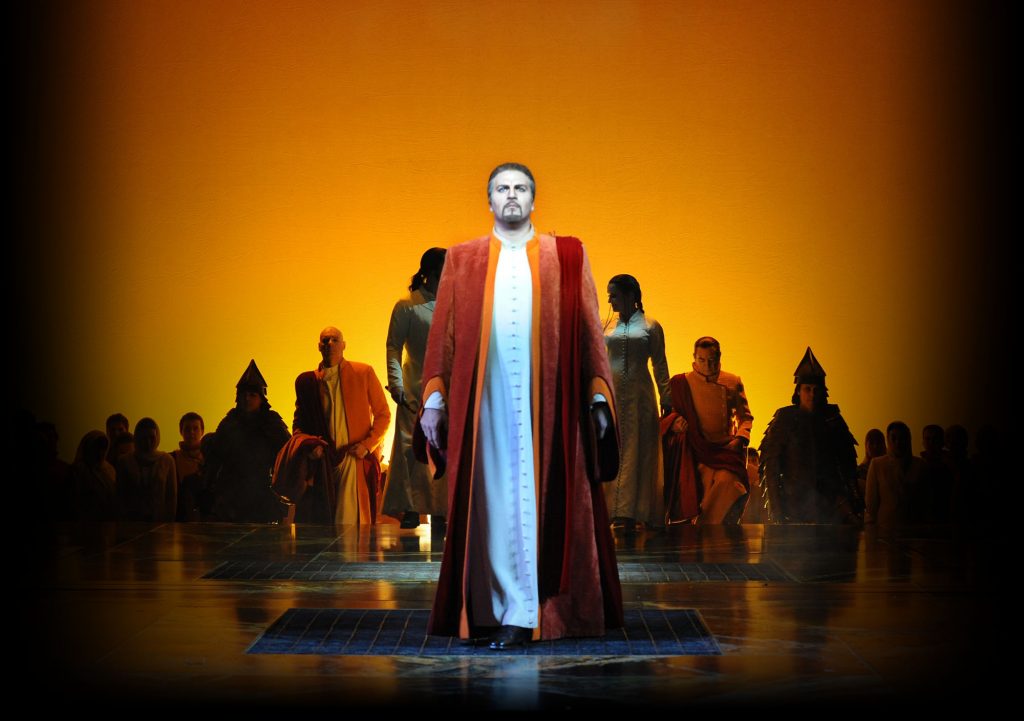
Madame Butterfly – Seattle Opera
Seattle Times – Aug 7, 2017 (Melinda Bargreen)
In a bit of “luxury casting,” Daniel Sumegi proved an unusually powerful Bonze.
Götterdämmerung – Opera Australia
Limelight Magazine – Nov 29, 2016 (Clive Paget)
The three Gibichungs are neatly differentiated, led by Daniel Sumegi’s tremendously powerful Hagen. The rich, dark tone is deployed brilliantly, from pitch-black conversational utterances in the subterranean nether regions of the voice up to the focussed foghorn (in the best sense of the word) required for a bravura Summoning of the Vassals. He slightly overdoes the villainy early on, but soon settles in to give an attractively nuanced account of this sad, poisoned child of an unloving father.
Sydney Morning Herald – Nov 29, 2016 (Barney Zwartz)
On stage Daniel Sumegi’ s implacable and intense Hagen dominated until Lise Lindstrom’s immolation scene. The naive hero Siegfried and his unheroic royal brother Gunther were no match for Sumegi’s tough, assured villain with the powerful, dark bass.
Concertonet.com – Nov 28, 2016 (Gregory Pritchard)
Daniel Sumegi augments his role as Fasolt reincarnated as the equally threatening if more hardened Hagen; his marvelously rich bass booms threat and evil into every corner of the auditorium.
Time Out – Nov 30, 2016 (Tim Byrne)
But they have a Rasputin in their midst: Hagen (Daniel Sumegi) their half-brother and son of the evil dwarf Alberich (Warwick Fyfe). He, like everyone connected to that poisonous toad, is in the thrall of the ring and will stop at nothing to possess it…Sumegi is magnificent as the utterly corrupted Hagen.
The Saturday Paper – Dec 10, 2016 (Peter Craven)
With Götterdämmerung there is the everyday sinister magnificence of Daniel Sumegi’s Hagen, which works potently and with great virtuosity.
Bachtrack – Nov 29, 2016 (David Larkin)
The role of Hagen is a gift to the singer with the appropriate vocal and dramatic chops, and Daniel Sumegi gratefully seized upon it. He was adept as a schemer, and still more effective when he dropped the mask and appeared openly as the brutal villain. The sheer volume he conjured up in the call to the vassals was thrilling, but his rendition of the brooding watch song was also potent.
Das Rheingold – Opera Australia
Limelight Magazine – Nov 22, 2016 (Clive Paget)
Daniel Sumegi and Jud Arthur are back too as a pair of impressive giants. Sumegi is ideal casting as Fasolt, his sepulchral tone capturing the pathos as well as the stentorian menace.
The Australian – Nov 30, 2016 (Eamonn Kelly)
Among the local leads, it is Jacqueline Dark, Jud Arthur and Daniel Sumegi who inject intensity and menace into proceedings…Arthur and Sumegi loom large as lurching, booming giants Fafner and Fasolt before bringing snarling viciousness and brutal vocal directness to their roles as Hunding and Hagen, respectively.
Herald Sun – Nov 21 2016 (Paul Selar)
Performances increased in stature with the thuggish giants Fasolt and Fafner, contracted to build the new palace for the gods and filled out hugely by Daniel Sumegi’s rumbling earth and Jud Arthur’s benzene bass.
The Saturday Paper – Dec 10, 2016 (Peter Craven)
Yes, we get the giants splendidly sung by Jud Arthur (Fafner) and Daniel Sumegi (Fasolt), looking terrific on their mechanical elevations…
Der Fliegende Holländer – Seattle Opera
Seattle Times – May 9, 2016 (Melinda Bargreen)
As Senta’s father, the sea captain Daland, Daniel Sumegi creates a memorable portrayal with his mighty voice and his deft acting.
Queen Anne News – May 11, 2016 (Maggie Larrick)
As a bluff Daland, Daniel Sumegi had some amusingly clueless moments trying to persuade his daughter, Senta, to marry the Dutchman. The duet of Sumegi’s rich bass with Grimsley’s sonorous bass-baritone in Scene 2 was pure pleasure to hear.
Opera Click – May 15, 2016 (Viviana Coppo)
Daniel Sumegi (Daland), also already heard in Seattle in the editions of the Ring in 2009 and 2013, confirms his vocal and stage skills. In the duet with Senta he emphasizes the moments of dramatic tension with the nobility of phrasing and rich timbre across the vocal range, but not lacking in irony, like his character requires, and its interpretation is supported by a good breath technique and resonance control.
Beethoven 9th and Meistersinger Excerpt – Orchestra of the Music Makers
The Straits Times – Mar 6, 2016
Australian bass singer Daniel Sumegi proved a natural Wagnerian with his delivery of the magisterial words of Hans Sachs, and an instinctive Beethovenian with his stentorian admonitions before the climactic statement of the Ode To Joy.
But he was most impressive as an impromptu compere, genially inviting the capacity audience to take a mass selfie before the Beethoven began. What palpitations this must have caused the Esplanade’s anti- camera politburo can only be imagined, but it was a lot of fun.
Luisa Miller – Opera Australia
Sydney Morning Herald – Feb 14, 2016 (Peter McCallum)
…while Daniel Sumegi, in the villainous, nominally determinative role of Wurm, conjured a thuggish, brick-like tone of implacable malice.
The Daily Telegraph – Feb 14, 2016 (Tom Pillans)
Daniel Sumegi played the villainous Wurm, who conspires to force Luisa to abandon Rodolfo to save her imprisoned father (Slovakian baritone Dalibor Jenis). Wurm is one of Verdi’s blackest roles and Sumegi’s creepy interpretation, backed by his unrelenting bass, fitted perfectly.
Broadway World – Feb 18, 2016 (Jade Kops)
Even more manipulative, Count Walter’s retainer, Wurm is presented with diabolical deviousness by Daniel Sumegi. Sumegi oozes Wurm’s pure evil as the sinister sleeze that gets what he wants through lies and deceit, fueled by the Count’s plans. His deep ominous bass expresses danger and that he is not to be trusted, even though everyone falls for his trap. Verdi’s music and Salvatore Cammarano’s (Liberetto) writing in this respect give both Count Walter and Wurm a pantomime villain caricature, which also resulted in traditional pantomime response from the audience at the curtain call.
The Magic Flute – Opera Australia
The Daily Telegraph – Jan 10, 2016 (Tom Pillans)
Daniel Sumegi’s Sarastro displayed his customary commanding presence, underpinned by an awesomely deep bass.
Sydney City News – Jan 10, 2016 (Irina Dunn)
….Tamino, the protégé of the high priest Sarastro, sung in resounding bass by Daniel Sumegi.
The Pearl Fishers – Opera Australia
Australian Book Review – Jan 18, 2016 (Michael Halliwell)
Daniel Sumegi as Nourabad has as much voice as the other three (principals) combined, but the role gives him limited opportunity to shine: he is an impressive vocal and physical presence on stage as a brutal European overseer, trafficking in priestesses amongst other commodities.
Broadway World – Feb 23, 2016 (Jade Kops)
In addition to the secrets the men hide from each other, the racketeer Nourabad (Daniel Sumegi) adds an additional layer of complexity as he convinces the villagers that Leila’s voice is sacred and she must not be compromised which may diminish her “powers”…Nourabad is the pure villain in the work and his domineering insensitivity is conveyed in his voice as he treats Léïla as a possession and sets the angry mob on Nadir.
The Manchurian Candidate – Minnesota Opera
PostBulletin.com – Mar 9, 2015 (Jay Furst)
Also memorable is bass-baritone Daniel Sumegi as Shaw’s stepfather, the vice presidential candidate; if Sumegi hasn’t considered a political career with his booming voice and blustering personna, he’s missing an opportunity, though things don’t end well for his character.
Star Tribune – Mar 9, 2015 (Michael Anthony)
(Kevin) Newbury commands a cast that can only be called brilliant…Among the laudable others are Victoria Vargas (Mrs. Lowe), Daniel Sumegi (Sen. John Iselin), Angela Mortellaro (Jocie) and Adriana Zabala (Rosie).
The Magic Flute – Opera Australia
Daily Telegraph – Jan 5, 2015 (Tom Pillans)
The rich bass and imposing figure of Daniel Sumegi, as Sarastro, lent authority to the role in this, the third Opera Australia outing since the beginning of 2012.
The Sydney Morning Herald – Jan 4, 2015 (Peter McCallum)
Daniel Sumegi brought dignified weight to the role of Sarastro.
Ring Cycle (CD recording) – Seattle Opera
Wall Street Journal – Dec 10, 2014 (Matthew Gurewitsch)
In the great calls to arms of the foiled avenger Hagen, Daniel Sumegi thunders like Goliath, but in moments of private nightmare rivets the ear in his hushed dismay.
Norma – Victorian Opera
Sydney Morning Herald – Aug 24, 2014 (Barney Zwartz)
And what a luxury to have a bass of Daniel Sumegi’s stature singing the comparatively minor role of Oroveso.
The Australian – Aug 26, 2014 (Peter Burch)
Daniel Sumegi invested the role of Oroveso, the Druid leader, with the beauty and gravitas of voice for which he is acclaimed.
Limelight Magazine – Aug 26, 2014 (Alexandra Matthew)
Likewise, Daniel Sumegi, stalwart of the Australian opera scene, was a solid and consistent Oroveso. His loud and penetrating voice resounded in the Elisabeth Murdoch Hall, and commanded full attention in his opening Ite sul colle, o Druidi. I had worried that, giving so much of his voice at the beginning of the opera, Sumegi might have run out of steam, but I needn’t have feared: his Oroveso was steady and well-sung throughout.
The Magic Flute – West Australian Opera
The West Australian – Jul 17, 2014 (Rosalind Appelby)
…and Daniel Sumegi as a regal, fatherly Sarastro.
Australian Stage – Jul 19, 2014 (Cicely Binford)
…and Daniel Sumegi as the stately and authoritative Sarastro.
Sydney Morning Herald – Jul 21, 2014 (Candice Barnes)
Daniel Sumegi was in fine form as temple leader Sarastro, his bass voice boomed with authority – the literal ‘voice of reason’.
Emperor Of Atlantis – Lost and Found Opera
The West Australian – June 13, 2014 (Neville Cohn)
Central to the plot is Death’s decision to go on strike. The results of this are astonishing: soldiers from opposing sides, instead of killing one another, become friends. No-one dies. But the Emperor, a thinly veiled caricature of Hitler intent on world domination, is greatly put out by this extraordinary development. At the Emperor’s request, Death – a glowering, ominous presence in a first-rate characterisation by Daniel Sumegi – agrees to return to work. There is one non-negotiable condition: the Emperor is to be Death’s first “client”.
Rigoletto – Opera Australia
Artshub – April 16, 2014 (Michael Magnusson)
As Sparafucile, Daniel Sumegi is luxury casting, joined by Sian Pendry as an excellent Maddalene, richly voiced and splendidly acted.
Australian Book Review – May 2014 (Peter Rose)
Daniel Sumegi (such a fine Hagen last year) brought his customary presence and secure low notes to the role of Sparafucile; his first scene with Rigoletto was a highlight.
Eugene Onegin – Opera Australia
Herald Sun – April 17, 2014 (Catherine Lambert)
Daniel Sumegi is a charismatic Prince Gremin and delights the audience with his burly bass baritone.
Stage Whispers – April 2014 (Coral Drouyn)
But just when you think the singing really couldn’t get better, the astonishing bass of Daniel Sumegi, so rich and powerful in its lowest register, seals the stamp of excellence.
Artshub – April 17, 2014 (Michael Magnusson)
Daniel Sumegi is a glorious Prince Gremin
Crikey.com – April 17, 2014 (Ben Neutze)
Daniel Sumegi also makes a big impact as Prince Gremin with his final act aria.
Sydney Morning Herald – April 18, 2014 (Michael Shmith)
Daniel Sumegi’s Prince Gremin was indeed nobly performed
Götterdämmerung – Opera Australia
The Australian – Nov 27, 2013 (Michael Shmith)
Daniel Sumegi, suitably dark-voiced, presented Hagen as more of an Iago: suavity concealing mendacity.
Daily Review (crikey.com) – Nov 26, 2013 (Anthony Clarke)
Hagen, a towering, smooth suave villain, almost a Vincent Price on steroids, was colossal in presence and in voice. Bass baritone Daniel Sumegi was frighteningly effective in the role.
He would have dwarfed in presence many other singers, but found his match in our Siegfried, tenor Stefan Vinke. Hero and villain were ideal images of good and evil and Stefan Vinke’s helden-tenor was as resounding as Daniel Sumegi’s vocals of black power.
Limelight Magazine – November 26, 2013 (Alan John)
But it’s to Daniel Sumegi’s Hagen that you are unwaveringly drawn. Handsome, even dapper in his naval officer attire, he is cold as ice and, as we soon glean, wracked by inner conflict: his sense of entitled superiority over his half brother (whose blood is weak but ‘unstained’ by Nibelung heritage) wavers between arrogant conviction and self-loathing infused doubt. Surpassing his excellent Fasolt, Sumegi’s characterization is detailed and free of cliché, while his gigantic dark bass baritone never flags, almost seeming to function at times as the leader of the orchestra’s brass section.
For me, probably the most memorable scene in the opera, aside from the spectacular finale, was the nightmarish encounter between Hagen and his wretched father, now so eaten away by his greed and envy that he has become some kind of distillation of evil, shuffling across the stage like Max Schreck’s Nosferatu to feed his son’s hate-filled resolve with poison. (How central to this production is Warwick Fyfe’s remarkable Alberich! In musical and dramatic terms, it’s a towering achievement.) As the vision fades we see Hagen in his half sleep point a gun first at his departing father, then at his own head in a powerful reminder that the curse of the ring corrupts those that covet it as much as those that possess it.
At the sound of Sumegi’s mighty summons the good burghers of the Rhineland appear from all corners of the theatre, many in their tuxedos looking like they’ve literally stumbled from the ranks of the audience (although, armed to the teeth with hand guns as they are, perhaps an audience in Bogota rather than Melbourne).
The Opera Critic – December 6-13, 2013 (Harriet Cunningham)
Sumegi is a terrifying Hagen, with stony face and a gunmetal grey voice dipping effortlessly into the lowest registers.
Ring Cycle – Seattle Opera
Huffington Post – August 29, 2013 (Ivan Katz)
Daniel Sumegi’s Hagen (described in Das Barbecüe as a “goddamned half breed narcoleptic son of a bitch”) was stupendous. All brooding malevolence, he was very difficult to take one’s eyes off.
The Opera Critic – Aug 12-17, 2013 (Neil Jenkins)
Giants Andrea Silverstrelli as Fasolt (later as Hunding) and Daniel Sumegi as Fafner (later Hagen) asserted supremacy. The giants, as with the dwarfs, were evenly matched both physically and vocally. Sumegi’s rendition as Hagen was of unveiling importance.
Seattle Times – Aug 5, 2013 (Melinda Bargreen)
Ring opens in Seattle with shining Rheingold
Seattle Opera has served up a glittering “Das Rheingold” as the opening production in its four-opera “Ring,” which drew football-stadium cheers Sunday evening from an audience of Wagner devotees from all 50 states and 22 countries…
there’s not a weak voice anywhere in the cast…and the giants — Andrea Silvestrelli and Daniel Sumegi — surpassed themselves in the emotional range of their portrayals.
Memeteria – Aug 11, 2013 (Thomas May)
Making up for this – and grounding a sense of the “real world” power struggle into which Siegfried blithely blunders – was Daniel Sumegi’s Hagen, in a portrayal of spine-chilling menace and cold-blooded calculation. So weighty is the evil this Hagen incubates (manifested with peals of darkly rolling vocal thunder) that even he appears troubled by its implications, as we see in another highly successful scene: the dream-encounter with Alberich.
Bluebeard’s Castle – Perth International Festival
The Australian – March 5, 2013 (Paul Hopwood)
Sumegi’s glowing and powerful bass-baritone is ideally suited to the role of the flawed, troubled Duke Bluebeard. Commanding and bullying, he is also deeply in love and, perhaps as a result, deeply vulnerable. It was fascinating to watch Bluebeard’s masochistic participation as Judith strips away the ever-deeper levels of his personality, even though both he and the audience know it will all end badly. Sumegi’s ability to convey such a complex character was extraordinary.
Ring Cycle – Teatro Colón
Wiener Zeitung – December 12, 2012 (Stephan Burianek)
Outstanding also Simone Schröder as Fricka, Daniel Sumegi as Hagen and Gérard Kim as Gunther.
Lucia di Lammermoor – West Australian Opera
Australian Stage – July 16, 2012 (Anna Locke)
Daniel Sumegi was remarkable as Chaplin Raimondo. Much like Clayton, his stage presence is commanding and unlike some of the other leads, he interacted well with the chorus. His voice is pure and rich and the moments where he tells the wedding guests of Lucia’s madness, and tells Edgardo of Lucia’s death, are powerful.
The Lighthouse – Dallas Opera
Art and Seek – March 18, 2012 (Olin Chism)
The Dallas Opera has chosen its cast wisely. Tenor Andrew Bidlack, baritone Robert Orth and bass Daniel Sumegi were superb in Saturday’s performance, ably singing difficult parts and believably creating six different roles.
TheaterJones – March 17, 2012 (Gregory Sullivan Isaacs)
The three singers are fine singing actors who would not be out of place in either a Winspear Opera House mainstage opera production or a Wyly Theatre play…Daniel Sumegi, an impressive bass, thunders his damming and constricted religiosity until it literally drives the other two crazy.
Oedipus Rex – New Zealand International Arts Festival
National Business Review – February 25, 2012 (John Daly-Peoples)
Most impressive was Daniel Sumegi as Creon and the Messenger. He managed to convey a truly full character, communicating a real sense of urgency and drama through his singing.
Macbeth – Opera Australia
Crikey.com – Sept 15, 2011 (No author listed)
…the charismatic presence such as was apparent in Rosario La Spina’s Macduff or, especially, Daniel Sumegi’s magisterial Banquo.
Die Walküre – San Francisco Opera
Oregon Music News – June 25, 2011 (James Bash)
Stemme and company create palpable Walküre for San Francisco Opera
Daniel Sumegi’s superbly conveyed the brutal Hunding, and his aggressive, possessive treatment of Sieglinde, especially when Hunding pawed and ordered her around by snapping his fingers as if she were one of his dogs. She placated him with affection, but that didn’t stop his suspicion of Siegmund.
Salome – Washington National Opera
Washington Times – Oct 9, 2010 (Terry Ponick)
The best surprise of the evening was bass-baritone Daniel Sumegi. His wild-eyed, Jokanaan was the divine madman that you always imagined the Baptist to have been. Steely-hard, living in his own inflexible spiritual plane, Strauss’ Jokanaan—whom we first hear as a disembodied, amplified voice drifting up from the deep, dank pit in which he is imprisoned—proves to be the opera’s only genuinely moral character.
Jokanaan is a bit crazy, perhaps, by our lights. But he believes in moral absolutes, rights and wrongs, abstract concepts that never enter the minds of Herod’s amoral family. Jokanaan provides the opera with religious ballast. But he also serves as a secular symbol, a placeholder, a beacon of moral common sense not only in his own age but in Strauss’ corrupt 20th century world—a world that was about to end in abrupt and astonishing savagery at the outset of World War I. (Contemporary Washington DC might take heed of this message as well.)
Daniel Sumegi somehow managed to capture all of this, and more, in his magnetic performance Thursday evening. Veering from righteous indignation when hurling invectives at Herod’s court, to genuine compassion when he feels Salome is about to find the right path, Sumegi’s caveman Jokanaan is a force of nature, the catalyst that leads to the opera’s revolting final act.
Sumegi has a big, commanding voice and wields it with great skill here, transforming his character into someone much larger than life, someone who convinces you that he has really seen God. His powerful interactions with Deborah Voigt’s cunning Salome, both vocally and dramatically, become precisely the kind of magic that opera aficionados long to see and hear.
Götterdämmerung – Opera du Rhin, Strasbourg
Opera Magazine – March 2010 (Rodney Milnes)
At a first hearing Daniel Sumegi’s bass sounded almost too round and warm for Hagen, when one expects a hard edge, but he lacked nothing in the volume stakes when McVicar sensibly placed him right down at the footlights for the big moments. Hagen can so easily seem just a cardboard villain, but the characterization Sumegi had worked out with McVicar was very interesting. There has to be a tragic dimension to the man, to his being impelled through parentage to be an outsider. In my experience only Karl Ridderbusch has suggested this. There is no black-and-white in Wagner, rather infinite shades of grey.
Lady Macbeth of Mtsenk – Opera Australia
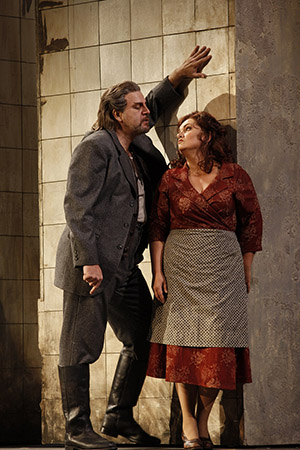
Lady Macbeth of Mtsenk – Opera Australia
Herald Sun – April 28, 2009 (Sybil Nolan)
Bullocks’s willing performance is a standout, matched by the Australian bass Daniel Sumegi as her appalling father-in-law.
Australian Stage – April 27, 2009 (Daniala Kaleva)
Daniel Sumegi (Boris Ismailov) portrayed the archetypal dominant rich male, who has power and status but is suspicious and fearful behind closed doors. Sumegi’s vehement vocal power sent chills down the spine of the listeners and thrilled them by its ability to carry over the full orchestra with such ringing might.
Sunday Herald Sun – May 3, 2009 (John Hay-Mackenzie)
Daniel Sumegi is at his best as Katerina’s sinister and cruel father-in-law. He is consistently vocally powerful and dramatically well controlled.
The Magic Flute – Opera Australia
Sydney Morning Herald – Feb 3, 2009 (Peter McCallum)
Daniel Sumegi produced some wonderfully focused deep sounds, and created a human, fallible Sarastro.
The Fool and the Opera (Blog Review) – April 18, 2009 (Paul Williamson)
Sumegi is an imposing, full voiced Sarastro, dominating the stage… The male chorus surround Sumegi for a striking, powerful version of O Isis and Osiris…it was Sumegi, Goodwin and Wilson whose voices shone most brightly.
ABC.net.au – April 28, 2009 (Nicholas Yardley)
Andrew Goodwin as Tamino, not only sounds good, but looks the part. The same can be said of Daniel Sumegi as Sarastro. He towers above the others and looks truly regal.
The Opera Critic – January 22, 2009 (Sarah Noble)
Daniel Sumegi is a commanding Sarastro, his authoritative bass a fitting evocation of wisdom and power.
The Mikado – Arizona Opera
Opera News – February 2009 (David Shengold)
Daniel Sumegi’s superbly projected Poo-Bah proved a hoot and a half, his voice in mellowly rumbustious estate.
Elektra – Washington Opera
Concertonet.com – May 14, 2008 (Micaele Sparacino)
As her son Orest, who had fled in exile after his father, the King Agamemnon, had been murdered, and who has now returned to help Elektra in the revenge murders of both Klytemnästra and her husband Aegisth, baritone Daniel Sumegi gave a commanding portrayal. He also has a huge voice and he paired well with Susan Bullock. They were memorable in the famous “Recognition Scene.” His presence created a real sense of foreboding and impending horror…….
Washington Times – May 12, 2008 (Tim Smith)
As Orestes, Australian baritone Daniel Sumegi is a big bear of a man with a deep, threatening voice to match, which added some needed ballast to this soprano-heavy score.
Opera News – May 13, 2008 (Tim Smith)
Daniel Sumegi cut a tall, beefy figure as Orest, with a big, sturdy sound to match.
Tannhaüser – Opera Australia
The Opera Critic – October 16, 2007 (Sandra Bowdler)
The Landgrave was sung with resonant authority by bass Daniel Sumegi, always an impressive performer.
Sydney Morning Herald – October 10, 2007 (Peter McCallum)
As Hermann, Daniel Sumegi blended vocal power with Neidhardt’s delicate lacings of hypocrisy in the characterisation.
Der Fliegende Holländer – Seattle Opera
Seen and Heard – August 19, 2007 (Bernard Jacobson)
The Australian bass Daniel Sumegi, meanwhile, was a sympathetic Daland–a personage whose easy-going venality and cosy human warmth recall the character of Rocco in Beethoven’s Fidelio –and projected with style and apparent ease the Italian melodic lines that coexist in the score with hints of the mature Wagner to come.
The Seattle Times – August 8, 2007 (Melinda Bargreen)
There wasn’t a weak spot anywhere in the cast, not with supporting roles filled by the likes of Daniel Sumegi (a terrific and multifaceted Daland)……….
Seattle Post Intelligencer – August 5, 2007 (R M Campbell)
Daniel Sumegi’s Daland, Senta’s father, was appropriately sober-minded, “a figure of everyday life,” who didn’t let love get in the way of greed.
Opera News – August 4, 2007 (John F Hulcoop)
Making his debut with Seattle Opera, Australian Daniel Sumegi made a marvelously robust Daland. Playing him as a simple seafaring man, Sumegi seemed entirely at home with the character and with his easygoing, easy-flowing bass-baritone. His voice melded perfectly with Grimsley’s in the lovely Act II duet, and he showed a nice sense of humor in handling those awkward transitional moments when Daland is with Senta and the Dutchman.
Der Rosenkavalier – Scottish Opera
The Guardian – Oct 7, 2006 (Tim Ashley)
Decay is omnipresent in the seedy glamour and guttering candles of the set (McVicar’s own). The tone is at times as much angry as nostalgic. One is struck… above all, in the way in which class divides are temporarily set aside in the communal ostracism of Daniel Sumegi’s lubricious, unusually attractive Ochs.
The Scotsman – (Kenneth Walton)
Of the male line-up, Daniel Sumegi’s Baron Ochs was big, booming and buffoon-like where it mattered.
The Herald – Oct 6, 2006 (Conrad Wilson)
Above all, this time around, McVicar has a cast that is potentially faultless, making it quite hard to decide who is the protagonist. Is it Rebecca Nash’s initially giddy, ultimately forlorn Marschallin; Sarah Connelly’s gaunt, observant Octavian; or Daniel Sumegi’s articulate, not merely buffoonish Baron Ochs – the role favoured by Strauss himself, portrayed here as someone still quite young, by no means obese and flamboyant enough to have won his Sophie were she a different sort of person.
bullet Il Barbiere di Silviglia – Glimmerglass Opera
The Ithaca Times – July 26, 2006 (Jane Dieckmann)
The music teacher Don Basilio was played by Australian bass Daniel Sumegi, with a voice both resonant and rich. The ending of the big aria “La calumnia” was among the opera’s funniest moments.
Ithaca Journal – July 20, 2006 (Stephen G. Landesman)
The Basilio of bass-baritone Daniel Sumegi was also refreshingly different for being less a risible caricature of the scheming music teacher than a genuine flesh-and-blood threat. Imposing in stature, Sumegi sang “La calunnia” with an unaccustomed menace and no bark, superb throughout save for his failure to initially rein in his booming instrument to a subtle piano before beginning the ascent to the aria’s ultimate crescendo.
July 10, 2006 (Chuck Klaus)
Daniel Sumegi’s dark and richly textured voice made his Basilio a worthy addition to an impressive singing and acting cast.
A Midsummernight’s Dream – Hamburg State Opera
Frankfurt Rundshau – March 28, 2006
Daniel Sumegi (Bottom) was able to equip his strong bass baritone with all humor necessary for the roll.
Abendblatt – March 27, 2006 (Jaochim Mischke)
Daniel Sumegi roars pliantly with rustic force through the part of the Bottom.
Financial Times – April 25, 2006 (Shirley Apthorp)
The cast is a wonderfully even line-up of excellence, from Ha Young Lee’s voluptuous Titania and Alexander Plust’s smoothly seductive Oberon to Daniel Sumegi’s generous Bottom.
Salome – Opera North
The Spectator – Feb 21, 2006 (Michael Tanner)
Jokanaan, when he appeared after booming away invisibly, acted his role, imprecating and waving his arms in a most prophetic way. Daniel Sumegi has a huge voice, not without an ingredient of grit, but the impression was as strong as this fake-religious music allows.
The Sunday Times – Jan 22 (Hugh Canning)
Opera North has assembled a fine supporting cast:…The bass-baritone Daniel Sumegi sang powerfully as Jokanaan. There are two more performances…they should not be missed.
The Times – Neil Fisher
Those seeking subtlety wouldn’t have found it in Daniel Sumegi’s oversized John the Baptist, either. Sumegi’s single-minded, fanatical portrayal — half Ayatollah, half David Blaine — thundered out with ruthless efficiency.
Don Carlos – Welsh National Opera
The British Theatre Guide – December 2005 – Mayflower, Southampton (Kevin Catchpole)
Much of the story concerns the machinations of the Church – a world clearly close to Verdi’s heart, though the clergy do not emerge from proceedings with much credit, least of all the Grand Inquisitor for whom the experienced veteran Daniel Sumegi was in splendid voice.
MusicOMH.com – October 26, 2005 (Dominic McHugh)
The Grand Inquisitor surprised me by being solid in every aspect, so well done to Daniel Sumegi
Operanews online – September 17, 2005 (George Hall)
There was a fine, focused Grand Inquisitor from Daniel Sumegi.
Seen and Heard – October 26, 2005 (Robert J Farr)
Other vocal highlights of the production were the scene between Philip and the Grand Inquisitor, sung with power and nuance by Daniel Sumegi.
The Opera Critic – October 15, 2005 (Catriona Graham)
As for the power politics and the religious fundamentalism, it is a difficult call which is more frightening – Andreas Silvestrelli as Philippe II or Daniel Sumegi as the Inquisitor.
The Barber of Seville – Welsh National Opera
Bristol Evening Post – November 18, 2005
It was full of lovely pieces of comic business but was never selfish, setting up some fine humour, with Daniel Sumegi’s wonderfully exaggerated self-centred singing teacher Don Basilio.
Opera – Jan 2006 (Rian Evans)
It was apparent that Daniel Sumegi, who was also singing the Grand Inquisitor in Don Carlos, enjoyed the contrast offered by an outrageously overthe-top Don Basilio.
Nabucco – Opera Australia
Sydney Morning Herald – July 1, 2005 (Peter McCallum)
Daniel Sumegi, richly grained and textured in the bass role of Zaccaria, the High Priest.
Luisa Miller – Washington Concert Opera
Washington Times, June 8, 2005 (T L Ponick)
Meanwhile, on the villainous side of the equation, the huge bass voices of Matthew Lau (Wurm) and Daniel Sumegi (Count Walter) were given an unusual opportunity to shine in this concert production. So often, bass voices this rich and resonant get buried during operatic stage performances. Here, though, both bad guys added significant heft and athleticism to the opera’s many gorgeous ensembles.
Washington Post – June 7, 2005 (Tim Page)
Bass Daniel Sumegi did his best with the hopeless role of Count Walter: His voice is a handsome one, dark and sinuous, with an edge.
Shostakovitch Symphony 13 – “Babi Yar” – Cincinnati May Festival
Cincinnati Enquirer – May 22, 2005 (Janelle Gelfand)
But what an extraordinary feat the symphony was, garnering richly deserved, tumultuous ovations for Australian bass Daniel Sumegi and the men of the May Festival Chorus from the large Saturday night crowd.
Cincinnati Post – May 23, 2005 (Mary Ellyn Hutton)
Led by May Festival music director James Conlon, with bass Daniel Sumegi, the men of the May Festival Chorus and the Cincinnati Symphony, it made a profound impact……..Australian born Sumegi was towering in Yevtushenko’s searing texts. From the threnody-like “Babi Yar” with its evocations of Russian pogroms and the loathing of a “true Russian” for anti-Semitism, to the dripping sarcasm of “Humor” and the haunting images of “In the Store,” where women struggle to buy scarce provisions, Sumegi sang with power and expression.
Mahler 8th Symphony – City of Birmingham Symphony Orchestra
The Times June 7, 2004 (Richard Morrison)
(Sir Simon) Rattle even cooked up a touch of visual drama: the youth choruses cupped their hand around their mouths at the climax…what a sroke of showmanship. No cupped hands from the eight soloists, but plenty of glorious welly – particularly from Christine Brewer, David Wilson-Johnson and the outstanding Australian bass Daniel Sumegi.
Carmen – Welsh National Opera
South Wales Echo – May 28, 2004 (AJ Sicluna)
For swagger and style there was little to touch Daniel Sumegi as Escamillo.
The Western Mail – May 28, 2004 (Mike Smith)
Escamillo is robustly sung by Daniel Sumegi, not a swaggering toreador buta rounded, worldly character acting as a foil to the shattered innocence of Don Jose…
The Big Issue – May 31, 2004 (Cathryn Scott)
Daniel Sumegi, as Escamillo, also has a remarkable amount of power in his voice, giving a masterful performance of Toreador that fills the auditorium.
The Stage – June 10, 2004 (Jon Holliday)
Daniel Sumegi is a dominating, powerfully sung presence as Escamillo.
Plymouth Evening Herald – June 17, 2004 (Phillip R Buttall)
…whilst Daniel Sumegi presents a suitably swaggering Escamillo, with a voice to match.
Birmingham Evening Mail – June 25, 2004 (Paul Fulford)
…while Daniel Sumegi was a hugely impressive Escamillo, a proud, swaggering, sneering pragmatist.
Bristol Evening Post – July 1, 2004 (Gerry Parker)
You need flair and confidence to be a bullfighter – qualities that Daniel Sumegi had in abundance.
Flying Dutchman – Austin Lyric Opera
Austin Chronicle – March 26, 2004 (Jerry Young)
We’d assume that a girl’s father wouldn’t encourage a cross-century romance, but for Senta’s father, Daland, the answer lay in the captain’s treasure. Daniel Sumegi managed to show Daland’s enthusiasm for the promise of wealth without making us resent him.
The Flying Dutchman- Opera Australia
Sydney Morning Herald – January 27, 2004 (Peter McCallum)
Daniel Sumegi, stepping into the father role of Daland at short notice, was equally worthy. Vocally true and dramatically quick, he maintained pace and vocal colour, completing a tight-knit group of principal singers in a quartet of vivid vocal drama.
Messiah – Minnesota Orchestra
Pioneer Press – December 12, 2003 (Rob Hubbard)
… while bass Daniel Sumegi gave a properly dark menace to his aria. But Sumegi proved his versatility in the celebratory tone of Part III’s “And the trumpet shall sound,” upon which he and the trumpet soloist wove their tones about one another in a lively pas de deux.
Salome – Opera Australia
The Bulletin – September, 2003 (Humphrey McQueen)
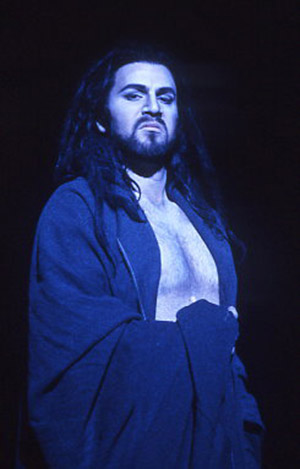
Salome – Opera Australia
…To the role of Jokanaan, Daniel Sumegi brought the vigour of a baritone and the resonance of a bass. He transcended the woodenness in the part to take charge of the scene when he is on stage. Only someone with his vocal heft could have been heard from the bottomless pit to which the director has condemned him. Only the surtitles made it possible to discern the threats that he hurled from that abyss….
Stiffelio – Washington Concert Opera
Opera News – September Edition (Tim Smith)
Daniel Sumegi (Jorg) summoned terrific vocal and interpretive force
Carmen – Opera Australia
The Australian – May 9, 2003 (Peter Burch)
The most robust presence of the night was Daniel Sumegi’s Escamillo, the bullfighter who lures Carmen’s affection away from Don Jose. Sumegi is a big man and an impressive actor, with a large and exciting voice that he used to powerful effect.
The Age – May 9, 2003 (John Slavin)
Carmen and the bullfighter Escamillo, come on dressed in formal black, like two characters who have strayed out of an Ibsen drama. Sumegi brings some much needed erotic fission to this dull evening. His baritone has a wonderfully dark timbre and he has the charisma of the bulls he fights. But if Carmen is so willfully independent of men, why, one wonders, does she fall for the biggest spunk on the block?
Die Meistersinger – Vlaamse Opera
Opera – Oct 2002 (John McCann)
The Pogner of Daniel Sumegi was capaciously sung.
De Standaard – Mar 25 2002 (Jan Vandenhouwe)
The bass Daniel Sumegi was a warm Pogner with a sonorous voice.
The Bulletin – Mar 28, 2002 (Camille de Rijck)
Bass Daniel Sumegi as the patriarch Pogner showcased an overwhelmingly powerful voice.
Luxemburger Wort – Mar 29, 2002 (Jean Lucas)
Among the other Masters is revealed the beautiful bass of Australian Daniel Sumegi, imposing as Veit Pogner.
Tristan und Isolde – Opera Australia
Stage Left – Nov 20, 2001 (James Moffatt)
The Kurwenal of Daniel Sumegi is nothing short of a revelation. An Australian bass currently building a solid international reputation, he is simply the best Kurwenal I have ever heard or seen. Sumegi has a stunning voice and a commanding stage presence.
Sunday Age – Nov 18, 2001(Neil Jillett)
There were also first class performances from basses Bruce Martin and Daniel Sumegi.
The Age – Nov 16, 2001 (John Slavin)
…while Daniel Sumegi, as Tristan’s retainer, Kurwenal, is nothing short of superb.
The Australian – Nov 16, 2001 (Peter Burch)
Daniel Sumegi is another singer whose performances have grown as we’ve watched over the past decade. His Klingsor in SOSA’s Parsifal in September was a triumph, and he proved to be an equally powerful vocal and stage presence in a richly realized Kurwenal.
Opera Opera – Dec 2001 (Clive O’Connell)
As well, Daniel Sumegi’s Kurwenal came over with impressive brio and clarity of character that argued for this singer’s increased vocal maturity and showed the rewards of his overseas experience through his acting with a good deal more savvy than most of his colleagues.
Parsifal – State Opera of South Australia
Sydney Morning Herald and The Age – Sept 25, 2001 (John Slavin)
…and Daniel Sumegi’s Klingsor has a thrilling presence and a resonant bass.
Opera – Feb 2002 (Elizabeth Silsbury)
And never has this company fielded such a superb cast…Daniel Sumegi a stunning Klingsor in black leather with dazzling diamond-studded codpiece (or non-codpiece, more correctly), vocally as vicious as his text and undoubtedly the least unconvincing character in the whole spectacle.
Il Pirata – Washington Concert Opera
Baltimore Sun – April 23, 2001 (Tim Smith)
A vocally commanding, dramatically involved cast made much of the score Friday evening at George Washington University’s Lisner Auditorium… Daniel Sumegi, as Gualtiero’s former tutor Goffredo, filled the hall with his grandly scaled bass and elegant phrasing.
Washington Post – April 23 2001 (Phillip Kennicot)
Bass Daniel Sumegi produced the largest tones – and they were pleasing tonally as well.
Don Carlos – Washington Opera
The Washington Times – Mar 24, 2001 (T L Ponick)
The Washington Opera’s new production of Giuseppe Verdi’s “Don Carlo” is easily the most magnificent ensemble performance of the season. Without a weak singer-actor in the cast, the company offers an example of how dazzling opera can be in it’s take on Verdi’s political, religious and psychological masterpiece… The role of the Grand Inquisitor is small but important. As sung by bass Daniel Sumegi, the Inquisitor is an implacable opponent to justice and decency, a religious fanatic who makes the late Ayatollah Khomeini look like a kindergarten teacher. Mr. Sumegi’s threats and pronouncements, sung clearly in the lowest notes available to a male singer, effectively cast a pall of fear over the entire evening.
New York Times – Mar 31, 2001 (Bernard Holland)
But Verdi’s subsidiary principal singers are a profound and pungent lot, and they have been strongly cast here…Daniel Sumegi bore the weight of the Grand Inquisitor nicely.
Opera News – July 2001 (Tim Smith)
The conflict between religious and secular authority was underlined with particular force by Paata Burchuladze as Philip and Daniel Sumegi as the Grand Inquisitor. Burchuladze’s penetrating sound (though prone to sharpness) and sensitive phrasing got to the heart of “Ella giammai m’amò.” His subsequent exchange with the Inquisitor was masterfully shaded to reveal slowly simmering fury. Sumegi, likewise producing rich bass tones, was just as effective at conveying his character’s inner strength and determination.
Tosca – State Opera of South Australia and Welsh National Opera
Opera – April 2001 (Elizabeth Silsbury)
Daniel Sumegi’s debut as Scarpia was generally admired for his superb, fruity but strongly focused bass. Those of us expecting villainy, raw lust and brutishness remained unconvinced that Sumegi would carry out his threat to violate Tosca, but his enthusiasm for the increasingly vicious torture was unmistakable.
The Western Mail (Cardiff) – Sep 30, 2002 (Mike Smith)
Just like the Spanish wine Scarpia savours, this is a robust, full-bodied and intoxicating Tosca….Add to that…a Scarpia of massive presence from fellow Australian bass Daniel Sumegi, and this was a night to sit back and relish every moment.
Evening Post (Bristol) – Oct 3, 2002 (Gerry Parker)
All too often, in an effort to show the evil within Baron Scarpia, an air of coarseness creeps into the portrayal dramatically and vocally. No sign of this with Daniel Sumegi’s smooth villain. Here was a man completely sure of his powers in knowing exactly how to make full use of them. This was a more charming Scarpia than we often see and all the more frightening as a result.
Birmingham Post (City Edition) – Oct 18, 2002 (Maggie Cotton)
Daniel Sumegi as debonair, calculating villain Scarpia, delivered his evil with superb voice, fine acting and imposing poise.
Birmingham Evening Mail – Oct 18, 2002 (Paul Fulford)
“Wicked Baron in Tour de Force”. Daniel Sumegi’s towering performance as a dastardly Baron Scarpia dominated the Welsh National Opera’s thoroughly enjoyable performance of Puccini’s tale of lust and betrayal. His poised singing and polished acting created a convincing Scarpia – half pantomime villain, half devil incarnate. Ironic boos as well as sincere applause greeted him at the end.
Der Rosenkavalier – Welsh National Opera
Opera – September 2000 (Rodney Milnes)
There is a half-formed tradition of young Ochses in this staging – Franz Hawlata’s first appearance here at the previous revival remains unforgotten – and it was well-sustained by Daniel Sumegi, like Hawlata a big, handsome man. He has all the notes from a real bottom C to an unstrained, full-voiced piano top F – stunning! – and as time goes by they will be joined together into more elegant phrases with a surer sense of overall line. He was at his best in the third act, gaining genuine tragic stature towards the end: the prescribed “deeply scornful bow” to the Marschallin spoke enough volumes to fill those bookshelves.
This is Oxforshire and Oxford Mail – June 30, 2000 (Chris Gray)
A memorable feature of this production is the performance of the young American (sic) Daniel Sumegi, in his British debut, as Baron Ochs. The determination of this thick-skinned aristocrat to wed a 15-year-old heiress with the help of her social climbing dad (Christopher Purves) provides the mainspring of the plot.
Hampshire Chronicle – July 14, 2000
Daniel Sumegi, firm and incisive, played a coarse and lecherous Ochs with considerable stage presence and seized the opportunity for touches of humour.
Evening Post (Greater Bristol) – June 15 (Gerry Parker)
Katarina (Karneus) provided some lovely moments of humour – as did Daniel Sumegi with his richly sung noble “yob” Baron Ochs.
I Puritani – Washington Opera
The Washington Post – Dec 31, 1999 (Phillip Kennicott)
Bass Daniel Sumegi (seen last season as the Reverend Hale in “The Crucible) is the best-cast singer in the production. As Giorgio, he covers notes with fullness of tone, and has the substantial breath support to sing a true, seamless Bellini line. His stage presence as the loving father figure, an alpha male with beta sensibilities, was also the most dignified and convincing of the evening. Baritone Jorge Lagunes as Riccardo sang a very rousing “Suoni la Tromba” with Sumegi – they blended nicely.
The Washington Times – Jan 1, 2000 (T.L. Ponick)
An exquisite cast of singers is needed to make this opera work. Fortunately, the Washington Opera seems to have put together just the right ensemble…Once again, the Washington Opera has been fortunate in it’s choice of talent. Bass Daniel Sumegi, in the role of Elvira’s compassionate uncle-protector Giorgio, is superbly authoritative. Mr. Sumegi sings with gravitas and sensitivity. His deep, powerful bass is clean and accurate. It never rasps or growls in the lowest notes and never falters or breaks in the taxing higher register…As Riccardo, … Jorge Lagunes…sets the martial tone for the opera, and his brilliant duet with Mr. Sumegi, which closes the second act, is one of the finest displays of male singing we have seen in some time.
Aida – Houston Grand Opera
Houston Press – Oct 28, 1999 – Nov 3, 1999 (Cynthia Greenwood)
As Ramfis, the High Priest, Australian Bass Daniel Sumegi was authoritative and robust.
Götterdämmerung – State Opera of South Australia
Opera News – July ’99
Perhaps the best of the singers was Daniel Sumegi, as Hagen, who simply dominated Götterdämmerung, both vocally and physically. His dark, sumptuous bass voice had no trouble quelling the vassals in act II, but he was not shy about singing softly and could be intimate and insinuating when necessary.
Opera Now – April/May ’99 (Shirley Apthorp)
…while Daniel Sumegi and Liane Keegan as Hagen and Erda gave truly thrilling performances, vocally rich, musically mature and theatrically convincing.
Faust – Opera Australia
Opera – January 1999 (Maria Prerauer)
…rendered by some very fine genuinely operatic voices, it became a nice night’s entertainment. Here the Devil does indeed have the best part, and the magnificent young bass, Daniel Sumegi, a gigantic larger-than-life Mephistopheles disguised as a cold, manipulative businessman, did not miss a trick. Surely a star in the making.
The Australian Financial Review, Weekend – August 22-23 (Meurig Bowen)
… All of this could fall flat without a fine cast. The double-act of imposing Daniel Sumegi and slightly awe-struck Vinson Cole works well as the thoughtful mere-mortal in too deep with the devil. With an astonishingly vibrant, blazing vocal presence, Sumegi’s Mephisopheles has to be one of the homegrown opera achievements of the decade.
Lady Macbeth of Mtsensk – L’Opéra de Nantes
Ouest France- June 8, 1998 (Jean–Luc Quéau)
As for Boris, the father-in-law of Katerina, he has an explosive bass made of granite, and enjoyed the dark tessitura required by the subject of Chostakovitch. One could not forget all the protagonists who have given the best of themselves.
Presse Océan- June 9, 1998 (A.P.D.)
…while Daniel Sumegi, incarnating Boris, transports instantaneously into this Russia where such a bass voice customarily makes the [isbas] tremble.
Samson et Dalila – Palm Beach Opera
Opera News, March 1998/Opera, August 1998 (Tim Smith)
Daniel Sumegi’s imposing bass and fluent acting made the High Priest a dominant presence.
Palm Beach Daily News – Jan 25, 1998 (Daniel G. Monek)
Both Samson, sung by Finnish tenor Heikki Sukola, and the high Priest, sung by Australian Daniel Sumegi, had clear and powerful voices. Many times they easily overwhelmed Polish singer Malgorzata Walewsaka’s Dalila, particularly in her act 2 duet with the high priest.
Macbeth – Houston Grand Opera
Houston Chronicle – Monday Oct 20, 1997
Bass Daniel Sumegi sang Banquo richly.
Houston Sidewalk – Arts Wednesday Oct 22, 1997
Bass Daniel Sumegi made a sturdy and impassioned Houston Grand Opera debut as Banquo.
Houston Press – Oct 23, 1997
In the role of Banquo, bass Daniel Sumegi turned in a noteworthy performance.
La Boheme – San Francisco Opera
San Francisco Examiner – June 17, 1996 (Allan Ulrich)
Bass Daniel Sumegi’s Colline set the standard…in this production.
Aida – The Australian Opera
Australian Financial Review – Fri 28th July, 1995 (Richard Synnott)
Young Sydney Bass Daniel Sumegi showed why he is in such demand abroad – his Ramphis, the High Priest, was a big and menacing vocal presence.
The Sun Herald – July 30th 1995 (John Carmody)
It was wonderful to hear the treacly blackness of Daniel Sumegi’s voice as Ramphis, the malign high priest.
Metropolitan Opera National Council Auditions Winners Concert
New York Times – March 31, 1994 (Bernard Holland)
Winners (no losers) from Met Auditions. The quality this year is exceptionally high…one cannot resist trying to predict who among them will find fame and fortune in their futures…Another candidate for success was Daniel Sumegi, an authentic bass from Australia with a confident command of styles ranging from Britten to Tchaikovsky.

